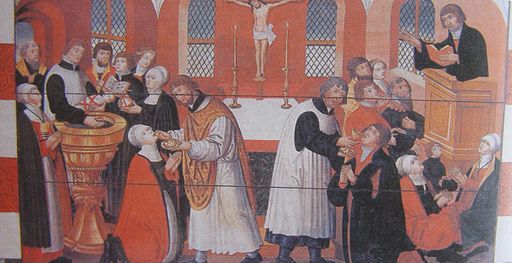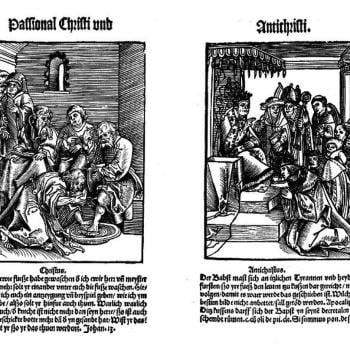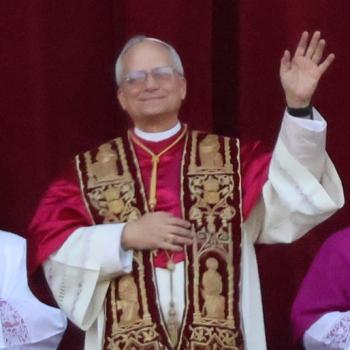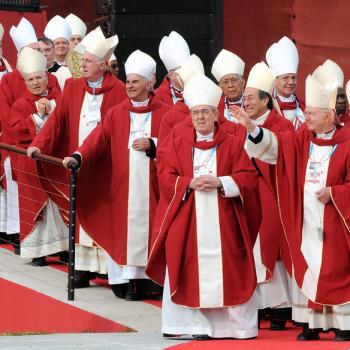Gordon T. Smith has written a book entitled Evangelical, Sacramental, and Pentecostal: Why the Church Should Be All Three. His thesis is that since Christianity exists in those three forms, we really should have churches that combine them all.
A review in Christianity Today agrees with his “exciting proposal,” that Christians today should bring those strains together in their congregations.
Well, there already are churches that are both evangelical and sacramental. These are called Lutheran. I would also describe them as pentecostal, not in the sense of speaking in tongues and the like but in stressing a personal supernatural experience of the Holy Spirit. Lutherans call that reading or hearing God’s Word. They are charismatic in the sense of receiving God’s supernatural gifts, which they call worshipping and receiving the sacraments.
Prof. Smith’s book only mentions Luther and Lutheranism three or four times, according to the index on Amazon’s “Look Inside!” feature, but never in a way that shows how his dream of combining the evangelical with the sacramental can be done.
I realize that he is not looking for Lutheranism, as such. He views the sacraments as “symbols,” which will prevent him from being truly sacramental. But Lutheran theology would help him with his project, for example, by showing how justification by faith alone fits in with baptismal regeneration.
Lutheran theology would help other non-Lutherans work out their difficulties. For example, Baptists are currently torn between Calvinist factions and Arminian factions. Lutheran theology could show them how it is possible to hold to salvation by grace alone (divine monergism), as Calvinists do, while also affirming, like Arminians, the Universal Atonement, that Christ died for all, so that potentially anyone can be saved.
Why do you think Lutheranism so often gets left out of theological conversations in which it would be highly relevant? It isn’t that Lutheranism is some tiny sect that few people adhere to. Depending on the statistics, it’s the largest or the second-largest (after Anglicanism) body of Protestants in the world. And yet it seems nearly unknown or mistakenly known in Anglo-American Christianity.
Part of the problem may be that Anglo-American Christianity is dominated by Calvinism, with its picture of the Calvinist Luther (the one who heroically started the Reformation but didn’t go far enough, with his work perfected by Calvin). People therefore assume that they know what Luther believed–basically Calvinism plus an idiosyncratic view of the Lord’s Supper–and so they assume that he and his followers have little to add that they don’t already have in Calvin. But maybe another part of the problem is the Lutherans’ fault in not interacting with any other Christians.
Any other ideas?
Illustration: The Lutheran Reformation in Denmark, [Public domain], via Wikimedia Commons
Evangelical, Sacramental, and Pentecostal: Why the Church Should Be All Three [Gordon T. Smith] on Amazon.com. *FREE* shipping on qualifying offers. Evangelical. Sacramental. Pentecostal. Christian communities tend to identify with one of these labels over the other two. Evangelical churches emphasize the importance of Scripture and preaching. Sacramental churches emphasize the importance of the eucharistic table. And pentecostal churches emphasize the immediate presence and power of the Holy Spirit. But must we choose between them? Could the church be all three? Drawing on his reading of the New Testament
“This book should awaken us from our churchly slumbers. The evangelical, sacramental, and pentecostal streams of Christianity celebrate different things, but we should not think of them, argues Gordon Smith, as competing alternatives. Rather, each of these traditions highlights something essential to full-orbed and flourishing Christian experience. We can no longer afford to pick one favorite while neglecting what the others have to offer. This is a provocative call for a fresh ecumenical synergy―for weaving all these elements together into something stronger and better than the older, isolating silos were able by themselves to deliver. Ever the pastor-theologian, Smith concludes with some practical proposals for moving us in this right direction.” (Glen G. Scorgie, professor of theology and ethics, Bethel Seminary San Diego)
“In Evangelical, Sacramental, and Pentecostal, Gordon Smith is a constructive provocateur. The word and in the title of the book is far from a mere grammatical connector. ‘And’ is indicative of Smith’s call to Christians, including evangelical Christians, to embrace together realities which too often are considered incompatible with each other, if not denied altogether. Furthermore, this call is not a call primarily to individual Christians or to some form of private piety. It is a call to churches―a call to churches to be the church. At the same time, this book is not primarily a critique but an invitation―an invitation to enter into and celebrate, in Smith’s words, ‘an ecology of grace.’ Evangelical, Sacramental, and Pentecostal is a wise and thoughtful invitation, accompanied by concrete suggestions, for churches to enter more fully into the grace that is found in union with Christ.” (W. David Buschart, professor of theology and historical studies, Denver Seminary)
“Christians often live in a state of spiritual malnourishment, choosing exclusively between the Word, sacraments, or renewal by the Spirit. In this timely pastoral appeal to overcome historical and theological divisions, Gordon T. Smith invites believers to be drawn into the fullness of life―fellowship with the living God―by embracing the divinely appointed means of grace.” (Jeffrey W. Barbeau, professor of theology, Wheaton College)


















